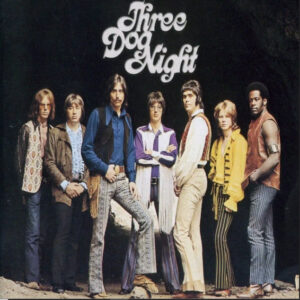Session 5: At-One-Ment?
Hello again, everyone,
Thanks to each of you who participated in our most recent class session. This past week we focused on Thurman’s concern for the “U” and “R” words (Utopia and Religion), and also how two related “S” words (Society and Science) influence how we understand and interact with the formal and informal hypothetical visions and working models of utopia in our lives.
In this new week of reading with Thurman and reflecting with one another, we are going to focus our class discussion much more on how Thurman’s writing and reflection shine the spotlight on our individual and shared experiences of community, rather than how our experiences help us better understand his life and theology. Please keep this pedagogical shift in mind as you are reading through Thurman’s next chapter this week, and also reviewing our other related course material.
Speaking of which, did you know that one of my favorite American musical groups from the 1970s was Three Dog Night? One of their greatest hits was the rocking and maddingly tragic ballad entitled “One.” Its lyrics name “one” as being a “lonely” number. “One”–as being negatively solitary. “One”–as an experience that is unfulfilled.
The experience of “One”–and related the principle and experience of “[o]neness”–does not always have to be so tragic, incomplete, or poor. Does it?
One is also a positive, mature ethical concept–pointing intellectually, ontologically, relationally to unity, integration, and wholeness.
This week we continue to dive deeper with Howard Thurman into the search for “community.” We will take all the previous insights we have gained from our individual reading and reflection, our corporate class time, and your initial work on your “Credo” project with us as we go deeper this week. Our main work is to critically, both spiritually and intellectually, break down the primary “ideals” that guide our thinking and our actions concerning our individual and collective human relationship to one another, and to all other living organisms and elements in Existence.
Are we currently “at one” with each other, with the planet, and with the Cosmos? Will we get to a place where we eventually are able to experience such “at-one-ment?” Or have we simply been believing in this vision as a pipe dream, too scared or too tired to wake up and face the reality of the many ways we, sadly, are more “apart from” than “a part of” the larger Life all around us?
Reflection Questions:
- The Abrahamic religious traditions (Judaism, Christianity, and Islam) traditionally have understood the human person and the human race as both integrated within and spiritually and cognitively distinct from all other forms of existence. This general belief has many variations, as well as more than a handful of critics, within the many manifestations of these three faiths as they have been practiced historically up to the present. How do you make sense of the place of the human person and the human collective in relation to all other organisms, forms, and elements of existence in the larger Creation? If you have experience studying or practicing one of these religious paths, how has its primary vision of the place and purpose of humanity impacted your self-understanding, your understanding of the Divine, and your understanding of the larger Creation?
- Hinduism, Buddhism and Taoism traditionally have also understood the human person as integrated within all other forms of existence. And these three wisdom traditions have also tended to denounce any particular primary importance or superiority attributed to any one human person or the human collective over/against other living things and strata of existence. If you have experience studying or practicing one of these religious paths, how has its primary vision of the place and purpose of humanity impacted your self-understanding, your understanding of the Divine, and your understanding of the larger Creation?
- Howard Thurman dedicates a good portion of this week’s chapter in Search for COmmon Ground to reflecting on the relationships certain individuals had with the natural world and larger Creation. For instance, his treatment of Francis of Assisi, Ernest Hemingway’s literary works, and his (Thurman’s) own autobiographical account of his childhood and adolescence in Waycross, Florida. What do you make of this section of his writing in this chapter? More specifically, how does Thurman including his own lived experience earlier in his life enrich or complicate his work in this chapter for you?
Scripture
“Lift up your eyes and look to the heavens: Who created all these? The One who brings out the starry host one by one and calls forth each of them by name. Because of God’s great power and mighty strength, not one of them is missing.” Isaiah 40:26
Readings:
- Chapter 5: “The Search in the Common Consciousness” from Thurman’s Search for Common Ground.
- Thich Nhat Hanh’s poem “Please Call Me By My True Names.” here.
- Three Dog Night’s song One (1969). Please listen and enjoy!
 View print-friendly version
View print-friendly version
1 Comments
Related Posts

Mission for an Evolutionary Christianity
We are living through tumultuous times. Political polarization intensifies, violence against vulnerable populations escalates, and the foundational principles of human dignity face erosion. For many, the cognitive dissonance between professed…



I think that too often, Christian dialogue unwittingly assumes that God only devised a salvific creation for Christians, whereas God surely devised one plan for ALL , So we need to consider this when we limit our discussion to a purely Christian standpoint. Modern catholic theology has to cast its perceptions within an evolutionary and pan- human context rather than in a static world view context and without considering the situation of humanity as a whole. There is much to do in this regard and too few Catholic theologians have taken up this challenge.
Alan Sage. Cumbernauld Scotland